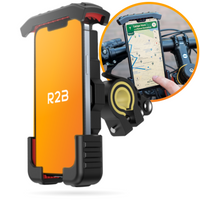No Products in the Cart
Ik rij op een fatbike die max 25 kilometers kan rijden ben ik dan ook verplicht om een helm te dragen als de wetsvoorstellen beslissen dat er een helmplicht komt of geldt t alleen voor de opgevoerde exemplaren
Time to read 4 min
Fatbikes, known for their wide tires and rugged looks, have become incredibly popular on both public roads and rough terrain. But with the increase in the number of fatbikes, especially the electric variants, the question arises: is it mandatory to wear a helmet on a fatbike? In this blog, we discuss the current regulations regarding helmet requirements on a fatbike, the consequences of breaking the rules, and provide practical safety tips. We also present our choice for the best bicycle helmet and essential e-bike accessories. Safe riding starts with the right equipment and following the rules.
Table of contents:
Fatbikes continue to grow in popularity in the Netherlands, especially among young people and adventurous cyclists. These robust bikes, designed for challenging terrains such as sand, snow and mud, have become a familiar sight on the Dutch streets. The electric versions are particularly popular, due to their comfort, stability and the ability to reach speeds of up to 25 km/h. However, with this increase in popularity comes new regulations to ensure safety. The Dutch House of Representatives recently adopted stricter regulations that introduce a helmet requirement and age limit for fatbikes. In this article, we explain what these new regulations entail and what they mean for both current and future fatbike owners.
The current regulations regarding the helmet requirement for fat bikes are clear: a helmet is not mandatory for fat bikes. This does apply to speed pedelecs, which fall under the same rules as mopeds. Wearing a helmet is currently not mandatory for a regular electric bike, but Veilig Verkeer Nederland strongly recommends it to prevent serious head injuries. It is important that your fat bike complies with the rules, otherwise you run the risk of fines and other sanctions. Cyclists on Dutch cycle paths must also take these rules into account to ensure the safety of all road users.
The new rules, which were recently adopted by the House of Representatives but have not yet entered into force, consist of two important measures:
The choice for a minimum age of 14 years is based on research that shows that younger children are often unable to properly assess complex traffic situations. They also have more difficulty handling the speed and weight of a fatbike. Although there were also voices in the debate for a higher age limit of 16 years, 14 years was ultimately established as a compromise.
Using electric bicycles and e-bikes offers many advantages, but also entails some safety risks. To ensure your own safety and that of others, it is important to take some precautions. Below you will find practical tips for riding safely on your electric bicycle or e-bike:
Always wear a bicycle helmet: Even if it is not mandatory, a helmet can prevent fatal injuries in accidents.
Check the legal requirements: Make sure your electric bike complies with regulations, such as having a correct license plate and no throttle for certain models.
Insure your bike: Good insurance covers any damage and provides peace of mind.
Maintain your bicycle regularly: Check the condition of the thick tires and other parts to ensure optimal grip and safety.
Stick to the speed limit: Avoid tuned fat bikes that do not comply with the regulations to avoid fines and risks.
Be alert on cycle paths: Be considerate of other road users and respect traffic rules to avoid accidents.
By following these tips, you can safely enjoy your rides on Dutch cycle paths and other roads. Veilig Verkeer Nederland emphasizes that conscious and careful e-bikers contribute to safer traffic for everyone.
Our R2B bicycle helmet is the perfect choice for every electric fatbike rider. With its LED lighting you are extra visible on the road, which significantly increases your safety. This helmet is not only comfortable and stylish, but also meets the highest safety standards, ideal for electric bicycles and e-bikes, but also for the regular bicycle.
Moreover, it is versatile enough to also be used as a skate or inline skate helmet. Choose the R2B bike helmet and ride your fatbike with confidence and safety.
In addition to a good bike helmet, there are other essential accessories that will make your e-bike experience safer and more comfortable. For example, consider a sturdy phone holder for the bike , so that you always have your navigation at hand without compromising your safety. A reliable bike lock is essential to protect your e-bike from theft. Also, don't forget a decent bike pump for properly inflated tires and a comfortable bike saddle for longer rides. Check out the full bike accessories page of R2B to see a wide range of essential bike accessories . With these accessories, you are fully equipped for every ride!
Violating the new rules can lead to hefty fines and even confiscation of the fat bike. Fat bikers who ride without a helmet risk a fine of up to several hundred euros. Parents of children under the age of 14 who ride a fat bike can also be held liable. In addition, violating the helmet requirement can also have consequences for insurance: insurers can refuse to cover damages if it turns out that the driver was not wearing a helmet during an accident.
Comments
Ik rij op een fatbike die max 25 kilometers kan rijden ben ik dan ook verplicht om een helm te dragen als de wetsvoorstellen beslissen dat er een helmplicht komt of geldt t alleen voor de opgevoerde exemplaren


